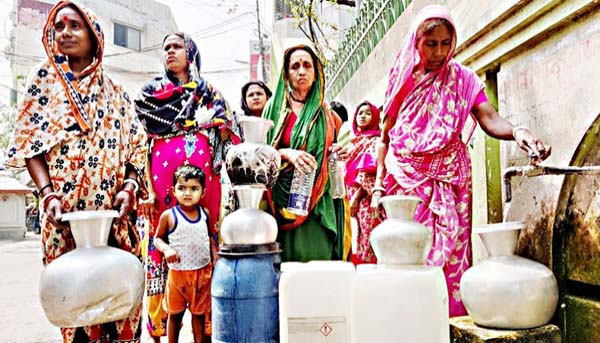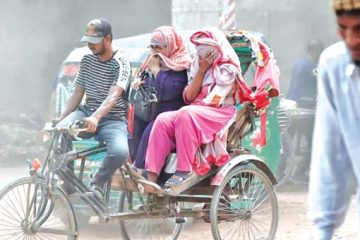Opinion
By AKM Mahmudul Haque
WATER, the essence of life, is a precious resource that sustains our planet and its inhabitants. Yet, despite the vastness of our oceans, only a small portion of the water is potable. Recent studies have revealed alarming statistics that approximately 80 per cent of the water supplied in cities and towns remains untreated, posing serious health risks to millions. However, despite this challenge, there are signs of hope. According to the World Bank, Bangladesh has made commendable improvements to its water supply systems. About 85 per cent of the world’s population now has access to a water supply because of the combined efforts of international organisations like WHO and UNICEF. Although 2.7 billion people globally experience water scarcity for at least one month every year, 1.1 billion still lack access to safe drinking water.
As we confront the global water crisis, it is essential to recognise the scale of the challenge we face. Even though 70 per cent of the Earth’s surface is covered by water, only 3 per cent is drinkable. Even more striking is the fact that Lake Baikal in Russian Siberia, which contains 23 per cent of this potable water, remains largely inaccessible due to its frozen state. This leaves the remaining 2.2 per cent of the Earth’s surface for the 7 billion people to share. The scarcity and preciousness of water necessitate urgent action and a paradigm shift in our approach to water management.
While the World Bank recognises Bangladesh’s commitment to improving the lives of its citizens through effective water management, it also underscores the urgent need to address the inadequate treatment of water in urban areas. It is imperative that the government and stakeholders prioritise investments in water treatment infrastructure, technology, and capacity-building initiatives. By ensuring that water is treated properly, we can safeguard public health and prevent the spread of waterborne diseases that disproportionately affect the most vulnerable members of society.
The achievements highlighted by WHO and UNICEF demonstrate that progress is possible, but there is much work left to be done. We must confront the sad reality that more than one billion people across the world still lack access to safe water, a basic human right. When we look at the numbers, a distressing reality emerges. In Bangladesh, especially in urban areas, the reality is also distressing. Sylhet, a city known for its scenic beauty and cultural heritage, grapples with water safety issues. Research funded by BANBEIS of the Ministry of Education under the GARE programme reveals that only a meagre 9.4 per cent of its residents expressed high satisfaction with the water supply, while a staggering 38 per cent reported being unsatisfied. Barisal, an important economic hub, faces a similar predicament, with 17.7 per cent of its residents expressing dissatisfaction and 9.9 per cent claiming to be completely unsatisfied with the water supply. These figures should serve as a wake-up call for city authorities, urging them to address the shortcomings in their water management systems.
One crucial aspect that demands immediate attention is the personal purification system. Shockingly, a significant portion of the population in both cities does not possess such systems, with 27.1 per cent in Sylhet and a staggering 67.7 per cent in Barisal lacking access to personal purification methods. This situation exposes individuals to potential health hazards and places an unnecessary burden on public utilities. It is imperative for city authorities to launch comprehensive awareness campaigns, encouraging residents to invest in personal purification systems, and also to ensure people’s access to affordable personal purification systems.
Moreover, the absence of systems for water reuse is deeply concerning. Both cities have a distressing statistic of 0 per cent when it comes to reusing water, indicating a missed opportunity to mitigate water scarcity and reduce the strain on freshwater sources. Implementing water reuse systems could play a pivotal role in conserving water and addressing the challenges posed by rapid urbanisation and population growth. City corporations must collaborate with relevant stakeholders to develop and implement effective strategies for recycling and reusing water, enabling a sustainable and efficient water management framework.
Another critical factor contributing to the current water crisis is the lack of initiative and supervision from city authorities. Astonishingly, research reveals a complete absence of authority-led initiatives and supervision for water reuse in urban Bangladesh. Such inaction perpetuates a sense of complacency and undermines the urgency of the situation. City corporations must step up and take the lead in promoting sustainable water management practices, investing in research and development, and implementing policies that encourage innovation and responsible water usage. Only through proactive and decisive measures can we secure a future where water resources are harnessed and preserved responsibly.
The challenges ahead are daunting, but not impossible. The city corporations have the potential, but appear to lack the will, to ensure sustainable water management, setting an example for other cities grappling with similar issues. City authorities must seize this opportunity to invest in modern infrastructure, foster community engagement, and prioritise the preservation and equitable distribution of water resources. By embracing sustainable water management practices, these cities can build resilience, enhance their livability index, and safeguard the well-being of their residents for generations to come.
The global water crisis requires a concerted effort to secure water for a sustainable future. While progress has been made, the challenges we face remain significant. By prioritising proper water treatment, investing in infrastructure, and fostering international cooperation, we can work towards a world where every individual has access to safe and clean water. Let us unite in this vital endeavour and embark on a journey towards a future where water scarcity becomes a thing of the past, ensuring the well-being and prosperity of all.
Dr AKM Mahmudul Haque is a professor of political science at Rajshahi University and governing council member at the Centre for Social Innovation and Sustainability, Rajshahi University.







